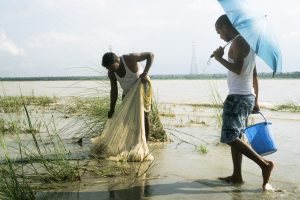Inland fishers and activists mingled with experts at a workshop on training of trainers on India’s fisheries policy
This article is by V V Sugunan (vasu.sugunan@gmail.com), retired Assistant Director General of the Indian Council of Agricultural Research, New Delhi, India
A prerequisite for implementing the ‘Voluntary Guidelines for Securing Sustainable Small-Scale Fisheries in the Context of Food Security and Poverty Eradication’ (the SSF Guidelines) is to mainstream these into the State’s policy and legal framework. In inland fisheries, this task proves stupendous for several reasons. Chief among them is the diffused nature of resources and the continuing unorganized and unempowered nature of stakeholders at the grassroots.
The problem is further compounded in inland fisheries by the poor tenure system or, rather, the lack of it. Many fishers still operate under customary and traditional tenure rights that are ill-defined and are not mainstreamed into any legal or policy instruments. Thus, they are often exploitated by vested interests working against social equity and environmental sustainability. Such flawed tenure systems can undermine all efforts to put in place development processes adhering to the SSF Guidelines.
The International Collective in Support of Fishworkers (ICSF) has been active in addressing this. It has organized events that catalyze efforts by the authorities at the policy and legislative levels to mainstream the principles of sustainable and equitable development of the SSF sector. ICSF events address international conventions and norms like the Code of Conduct for Responsible Fisheries (CCRF), the ecosystem approach to fisheries (EAF) and the SSF Guidelines.
During the two key workshops on implementation of the SSF Guidelines held in 2019, ICSF found it necessary to adopt a trainers’ training approach. This is effective in creating awareness among the fishers so that they can become partners in removing the obstacles in mainstreaming the principles of the SSF Guidelines. Further to such efforts, ICSF organized a National Training of Trainers (TOT) Workshop for Inland Fisheries in Kolkata on December 22-24, 2022. In attendance were key fishworker representatives from the states of Assam, Bihar, Jammu and Kashmir, Kerala, Maharashtra, Manipur, Odisha, Rajasthan and West Bengal.
The training programme tackled recognizing fishers’ tenure rights, their participation in resource management, the recognition of their rights to development and to create social safety nets for protection and security. This is important to actually obtain legitimate tenure rights of the fishers, enabling them to play their role in implementing the SSF Guidelines.

The workshop helped create a cadre of trainers for training, preparing them to make the fishers and fishing communities aware of the present situation and explore ways to correct the situation so as to become key players in creating their future. The trainers obtained valuable inputs and knowledge from experts and researchers. The highlights included the voluntary participation of a set of leaders who offered to be the trainers, and the presence of a large number of fishers who attended both individually and through their organizations. The translators played a basic role in interpreting the experts’ views to the fishers from various regions.
Issues and concerns
The programme revealed the multiple challenges in the inland open-water fisheries where the depletion of wild fish stocks affect the livelihoods of fishers. The fishers who target different resources under varying governance environments narrated the issues and concerns they encountered. The experts at the workshop, in turn, advised them on how to deal with such issues. Conflicting claims for water from different user communities are affecting inland ecosystems, their fishery resources and the services they provide, namely, fisheries-based livelihoods, also due to the low bargaining ability of the inland fishers.
There was a consensus at the workshop that concerted efforts by all players—from experts to those at the grassroots level—are needed to correct the situation. Although an uphill task, this is essential to inform the policy and legislative efforts about the rightful role of fishers in decision making while planning for water resource management programmes.
In sum, the Kolkata Workshop achieved the following objectives :
* Creating a cadre of trainers who can reach out to fishers and fishers’ groups to, one, train them on the SSF Guidelines; two, explain the benefits of, and make them aware of their role in implementing, the SSF Guidelines; and, three, create awareness on sustainable and equitable utilization of inland fisheries resources.
* Providing an opportunity for fishers and their organizations to interact with scientists, experts and officials to share their concerns and clarify doubts.
This process will meet its logical end when:
* The trainers go back and interact with the fishers and transfer knowledge to them;
* ICSF keeps in constant touch with the trainers to monitor progress and provide them the necessary inputs;
* ICSF interacts with the experts to obtain clarifications that trainers might need;
* ICSF tracks and assess the output obtained by each trainer, as also its impact based on the quantified outputs generated by the trainers; and
* ICSF initiates appropriate follow-up activities based on the achievements of the training programmes.
For more
National Training of Trainers (TOT) Workshop (Inland Fisheries) on the SSF Guidelines, Seva Kendra, Kolkata, West Bengal, 22-24 December 2022